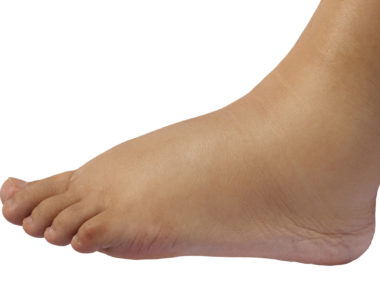 Our feet can swell for a variety of reasons. Some of these reasons aren’t cause for concern, while others warrant attention. Today, we take a closer look at five reasons why one or both of your feet may be swollen, and what you should do about it.
Our feet can swell for a variety of reasons. Some of these reasons aren’t cause for concern, while others warrant attention. Today, we take a closer look at five reasons why one or both of your feet may be swollen, and what you should do about it.
Why Are My Feet Swollen?
Here’s a quick look at five reasons why your feet may appear swollen:
1. Injury – Injury is the most obvious reason as to why you’re dealing with swelling in your feet. When your foot gets injured, blood can pool in the area and natural inflammation in the area can lead to swollen feet. If you sprain your ankle or bruise your heel, expect some minor to mild swelling in the area. This typically resolves on its own after a few days of RICE (Rest, Ice, Compression and Elevation), but if it doesn’t or if pain worsens, head to a foot specialist’s office.
2. Lymphedema – Your lymph nodes are an important part of your immune system, but if they get damaged or need to be removed (which is common during cancer treatment), your body loses the ability to get rid of fluids as easily as it once could. This problem is called lymphedema, and it can lead to swelling in your extremities, especially in your feet. Compression socks are one conservative treatment option that can help move fluid out of the area and reduce swelling, as can exercise. You can usually manage swelling caused by lymphedema on your own, but bring it up to your doctor on your next visit if you have any lingering concerns.
3. Kidney Damage – Your kidneys provide a vital bodily function in that they help expel waste from the body. If they aren’t working correctly – oftentimes due to a condition like high blood pressure or diabetes – too much salt can remain in the body. This excess salt means your body is also holding on the more water than it should. As you stand and walk, that water moves downward to your feet and legs, which can cause swelling. You should talk to your doctor about how to manage conditions that are affecting your kidneys.
4. Chronic Venous Insufficiency – Your blood flows back to your heart through your veins. If your veins get damaged or if you stand or sit for hours on end, your blood doesn’t return as it should to the heart. When this happens, it can pool in your feet and legs, which in turn leads to swelling. Exercise, stretching and avoiding standing/sitting for long periods can help keeping blood from pooling in your legs.
5. Pregnancy – Foot swelling is also natural during pregnancy. That’s because a woman’s body holds onto more water when she’s pregnant. Swelling can happen at any point during the pregnancy, but it can get even worse at the end of the day or if you’ve been standing for a long time. Swollen feet during pregnancy can be uncomfortable, but it’s usually not a sign of a problem for baby or mother.